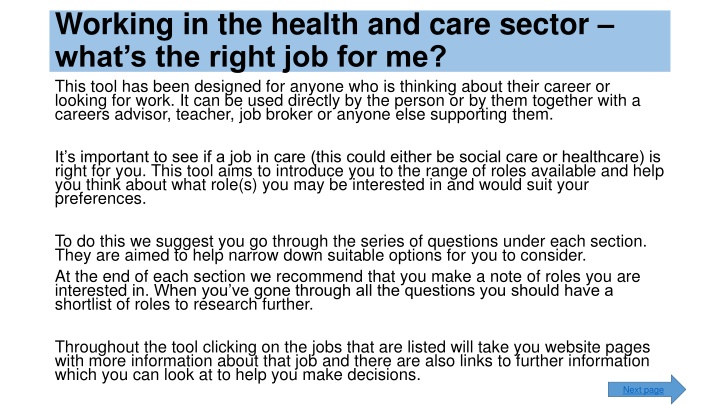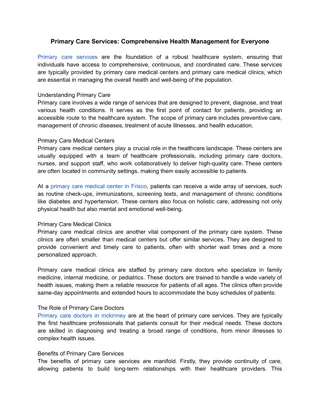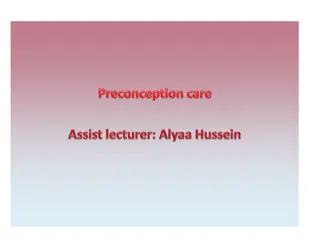Choosing a Career in Health and Care
The tool is designed to help individuals explore job opportunities in the health and care sector, covering various roles and preferences. It offers guidance on finding the right fit based on personal interests and traits. By answering specific questions, users can identify roles that align with their motivations and values, leading to potential career paths in health and social care.
Uploaded on Mar 06, 2025 | 2 Views
Download Presentation

Please find below an Image/Link to download the presentation.
The content on the website is provided AS IS for your information and personal use only. It may not be sold, licensed, or shared on other websites without obtaining consent from the author.If you encounter any issues during the download, it is possible that the publisher has removed the file from their server.
You are allowed to download the files provided on this website for personal or commercial use, subject to the condition that they are used lawfully. All files are the property of their respective owners.
The content on the website is provided AS IS for your information and personal use only. It may not be sold, licensed, or shared on other websites without obtaining consent from the author.
E N D
Presentation Transcript
Working in the health and care sector what s the right job for me? This tool has been designed for anyone who is thinking about their career or looking for work. It can be used directly by the person or by them together with a careers advisor, teacher, job broker or anyone else supporting them. It s important to see if a job in care (this could either be social care or healthcare) is right for you. This tool aims to introduce you to the range of roles available and help you think about what role(s) you may be interested in and would suit your preferences. To do this we suggest you go through the series of questions under each section. They are aimed to help narrow down suitable options for you to consider. At the end of each section we recommend that you make a note of roles you are interested in. When you ve gone through all the questions you should have a shortlist of roles to research further. Throughout the tool clicking on the jobs that are listed will take you website pages with more information about that job and there are also links to further information which you can look at to help you make decisions. Next page
Menu Click on the link to go straight to that section. If you don t know much about care then we suggest you start at section 1. 1. Section 1 2. Section 2 3. Section 3 Do you want to work directly with people or not? 4. Section 4 What sort of organisation / work setting do you prefer? 5. Section 5 Would you be happy to work shifts? Are you looking for full time or part time work? 6. Section 6 Do you want to work in social care or health care? 7. Section 7 Do you want a job with good career development? 8. Section 8 Are you looking for work now? Is a care role for me? How much longer do you want to study? What are your education & qualifications options? Next page
Section 1: is a care role for me? What is working in care about? The health and social care sector is one of the biggest employers. There are always lots of job vacancies and well over 300 different roles to choose from. The number of jobs in care are increasing if you choose to work in a care role you d never be out of a job! Working in social care is about providing personal and practical support to help people live their lives. Working in health care is about supporting people with their health needs. There s a career in health and social care for anyone who has the right values and skills. Back to menu Next page
Section 1: is a care role for me? The questions in this section help you consider whether work in the health and care sector is something you would enjoy and whether you are suited to a job in care. It asks you to consider what is important to you and what motivates you and then whether you are the sort of person who would be suitable for a role in care. Most jobs in health and care which involve direct work or contact with people require an interest in people and qualities like being caring and having compassion. Use the checklists and at the end you can decide whether to find out more about careers in care or look for a different kind of job. Back to menu Next page
Whats important to you? Yes Not sure / no Do you want a job that makes a positive difference to other people s lives? Is a job working with people more appealing to you than other types of work? Have you had personal experience of care through your family or friends? Are you interested because of a training course or work experience / volunteering you ve done? Has someone recommended a care role to you? Are you willing to be trained further to develop your work skills? Do you like to do things that are different every day and can be stimulating and challenging? If your answers were mainly yes then we would recommend you consider a career in care If your answers were mainly no - care work may still be right for you carry on to find out more Next page Back to menu
What sort of person are you? What sort of person are you? Tick all the statements below that apply to you Good at working with others friendly and interested in people Caring and compassionate Committed to quality care and improving lives Good communicator able to listen to and talk to people Able to build relationships and put people at ease Someone people will trust Able to write reports and records Able to treat people with dignity and respect Reliable Able to follow instructions and procedures Patient Can work to deadlines Can cope with new situations and handle pressure Able to respect and maintain privacy and confidentiality Can understand other people s feelings Willing to learn and develop at work If you had more ticks in the table than blanks, then we would recommend you consider a career in care If you didn t tick many above, then work in care may not be for you but you may be interested in technical or ancillary roles here Back to menu Next page
Still not sure? find out more If you are still not sure if a care role is right for you then Try A question of Care http://www.aquestionofcare.org.uk/ Try the health video challenge http://nhsvaluestool.e-lfh.org.uk/ See What values do I need to work in social care? See what core skills are needed Core skills for social care See Compassion in practice a set of values expected of nursing, midwives and care staff https://www.healthcareers.nhs.uk/i-am/still-unsure If you think a career in care is right for you then carry on! Section 1 Back to menu Next page
Section 2: experience, education & qualifications It s great that you re considering a role in care now you have to think about how much longer you want to study. It s important to know what the entry requirements are for the different jobs you may be interested in The education, qualifications, training and work experience you start with will influence which jobs you can get into. There are many jobs that don t require any qualifications or experience whereas others require you to complete a degree and / or undertake further study and training Click on your preference below and it will show which jobs you can consider 1. I would like to go straight into jobs which don t require degrees and where I can take qualifications and learn on the job 2. I would like to go to university and study for a degree 3. I want to gain more work experience Back to menu Next page
Jobs where you can learn and gain qualifications on the job If you click on any of the job roles it will take you to a webpage with more information about that role. Make a note of any you think you may be interested in. Social care roles Health roles Activity worker / Co-ordinator Advocacy worker Care co-ordinator / Care navigator / Community navigator Anatomical pathology technologist Care co-ordinator / Care navigator / Community navigator Commissioner Complementary therapy support worker Nursing associate Occupational therapy support worker Social prescriber Specialist co-ordinator Social care roles requiring degrees Health roles requiring degrees Care worker/Care assistant Commissioner Complementary therapy support worker Counsellor Enhanced care worker / Enhanced PA Housing support officer Management roles including Registered Manager Nursing associate Personal Assistant Reablement worker / Enabler Rehabilitation worker Senior care worker Shared Lives carer Shared Lives co-ordinator Social prescriber Social work / Occupational therapy support worker Specialist co-ordinator Support worker / Intervenor Team leader/supervisor You can enter many of these jobs via an apprenticeship see next page Section 2 Back to menu Next page
Apprenticeships available Social care apprenticeships Level 2: Adult Care Worker Level 3: Lead Adult Care Worker Level 4: Lead Practitioner in Adult Care Level 5: Leader in Adult Care Health care apprenticeships Level 2: Healthcare Support Worker; Healthcare Science Assistant; Pharmacy Services; Perioperative Support; Health Informatics; Emergency Care Assistance Level 3: Senior Healthcare Support Worker; Laboratory Technician; Pharmacy Services; Perioperative Support ; Maternity and Paediatric Support; Health Informatics; Dental Nursing; Allied Health Profession Support Level 4: Healthcare Science Associate; Associate Ambulance Practitioner Level 5: Healthcare Assistant Practitioner; Laboratory Scientist ; Perioperative Support Level 6: Healthcare Science Practitioner; In development: Social Work (Level 6) Occupational Therapy (Level 6) In development: Registered Nurse (Level 6) Occupational Therapy & Physiotherapy (Level 6) Thinking of doing a care apprenticeship? Section 2 Health apprenticeships, traineeships and cadet schemes https://www.gov.uk/apprenticeships-guide Next page Back to menu
Jobs requiring degrees If you click on any of the job roles it will take you to a webpage with more information about that role. Make a note of any you think you may be interested in Social care roles requiring degrees Health roles requiring degrees Health roles requiring degrees Audiologist Biomedical scientist Cardiac physiologist Clinical audit facilitator Clinical scientist Clinical technologist Dentist Diagnostic radiographer Dietitian Doctor Drama therapist Medical physicist Midwife Occupational therapist Operating department practitioner Paramedic Pathologist Pathology links officer Pharmacist Physiotherapist Psychiatrist Psychologist Psychotherapist Reconstructive scientist Registered nurse Respiratory physiologist Specialist paramedic Speech and language therapist Surgeon Systems analyst Occupational therapist Registered nurse Social worker Specialist social worker Many jobs requiring degrees lead to professional roles see next page Next page Back to menu Section 2
Professional roles The word professional is usually used to describe a job which requires a qualification recognised by a professional body (such as the General Medical Council, Health and Care Professions Council, Nursing and Midwifery Council , General Dental Council and others) These roles usually involve studying to degree level or above. If you click on any of the job roles it will take you to a webpage with more information about that role. Make a note of any you think you may be interested in Biomedical scientist Chiropodist / podiatrist Chiropractor Clinical scientist Dentist / dental technician Dietitian Doctor Hearing aid dispenser Occupational therapist Operating department practitioner Opticians / optometrist / Orthoptist Osteopath Paramedic Pharmacists/ pharmacy technician Physiotherapist Practitioner psychologist Prosthetist / orthotist Radiographer Registered nurse / midwife Social worker Speech and language therapist. Next page Section 2 Back to menu
Voluntary work /work experience Most employers will ask for relevant experience - this is particularly important for jobs you can do straightaway without a degree. Some degrees (such as social work) will also expect you to have relevant work experience. Some people gain work experience through school or college courses but this is often not enough and it can be useful to do some relevant voluntary work as this helps you build your experience, knowledge and skills . Links to sites where you can find voluntary roles are listed at the bottom of the page. Doing voluntary work whilst studying on e.g. a degree programme is really advisable and can enhance your employability considerably. How to Volunteer Gaining experience for health careers Why volunteer? https://do-it.org/ Section 2 Back to menu Next page
Still not sure? find out more If you know that you want to do a degree then remember you will need to meet the entry requirements for that degree subject see UCAS entry requirements If you are interested in a job where you can take vocational qualifications on the job see Care qualifications https://www.stepintothenhs.nhs.uk/ https://www.healthcareers.nhs.uk/I-AM Make a note of any roles you have seen so far that you might be interested in. Back to menu Next page Section 2
Section 3: direct work with people or not? You can choose to do roles that involve directly working with people or roles that don t involve much contact with people. You also need to consider whether you are happy to work in a role that involves personal care (e.g. washing and dressing someone) and roles that are dealing with bodily fluids (blood, faeces, urine, vomit etc) Click on the link below that matches your preference 1. Roles that involve personal care and/or roles that deal with bodily fluids 2. Roles working with people that don t involve personal care 3. Technical and ancillary roles (not directly working with people) Back to menu Next page
Personal care and roles dealing with bodily fluids Many people have an aversion to doing personal care or to seeing someone naked or to having to deal with bodily fluids. It is really important to think about whether you are willing to do this sort of role . Remember for many roles this is a very small part of the job and when you have done something once it becomes normal and easier to do again Social care roles involving personal care Health care roles involving Health care roles involving bodily fluids personal care Care worker / Care assistant Enhanced care worker / Enhanced PA Nursing associate Personal Assistant (PA) Reablement worker / Enabler Registered managers and other managers may need to cover Registered nurse Senior care worker Shared Lives carer Doctor Maternity support worker Midwife Nursing associate Paramedic Registered nurse Specialist paramedic Anatomical pathology technologist Biomedical scientist Medical laboratory assistant Operating department practitioner Pathologist Phlebotomist Surgeon Section 3 Back to menu Next page
Direct work with people roles that dont involve personal care Care roles Health roles Health roles Audiologist Cardiac physiologist Care co-ordinator / Care navigator / Community navigator Complementary therapy support worker Diagnostic radiographer Dietitian Drama therapist Hospital/health play specialist Maternity support worker Occupational therapist Occupational therapy support worker Operating department practitioner Pathologist Physiotherapist Psychiatrist Psychologist Psychotherapist Reconstructive scientist Reconstructive scientist Respiratory physiologist Social prescriber Specialist co-ordinator Speech and language therapist Activity worker / Co-ordinator Advocacy worker Care co-ordinator / Care navigator / Community navigator Complementary therapy support worker Counsellor Housing support officer Occupational therapist Rehabilitation worker Shared Lives co-ordinator Social prescriber Social work / Occupational therapy support worker Social worker Specialist co-ordinator Support worker / Intervenor Team leader / supervisor Next page Section 3 Back to menu
Technical and ancillary roles Health roles Health roles Care roles Administrator / Receptionist Assistive Technology worker Coach / Trainer / Assessor Cook Driver Employment adviser / Inclusion worker Finance worker Housekeeper HR officer Informatics and data worker Maintenance worker Marketing officer Training officer / Learning & Development manager Welfare rights officer Volunteer co-ordinator Accountant / Director of finance Anatomical pathology technician Biomedical scientist Chef Chief Executive Clinical audit assistant Clinical audit facilitator Clinical coder Clinical technologist Communications PR executive Decontamination sciences technician Director of operations Electrician Emergency medical dispatcher Emergency services call handler Estates manager Gardener Housekeeper HR professional Information analyst IT helpdesk advisor IT support officer Laundry assistant Medical laboratory assistant Medical physicist Medical records clerk Medical secretary Network manager Pathology links officer Personal assistant Porter Systems analyst Section 3 Back to menu Next page
Still not sure? find out more Have you decided between a role working directly with people or a technical / ancillary role? If not find out more by looking at: http://www.skillsforcare.org.uk/Care-careers/Think-Care-Careers/ https://www.healthcareers.nhs.uk/Explore-roles Make a note of any roles you have seen that you might be interested in. Back to menu Section 3 Next page
Section 4: work settings Some people prefer working in large organisations or as part of a large team, others prefer working on their own and / or in a community setting. There are jobs available in lots of different settings. Click on the link below that matches your preference or interest 1. Roles working in someone's home 2. Roles based in the local community 3. Roles in large organisations 4. Roles in small or medium sized organisations Back to menu Next page
Roles working in someone's home Care roles Domiciliary care involves caring for someone in their own home so being a domiciliary or home care worker means that all of your time will be spent working in someone's home. Other care roles based in someone s home include: Personal Assistant Shared Lives carer (where you share your home with them) Health roles Most health roles take place in a range of settings but the ones that involve the most time spent in people s homes are: Registered nurse (district nurse) Hospice at home / specialist palliative care nurse Other roles spend a proportion of time in people s homes including: Complementary therapy support worker GP Occupational therapist /occupational therapy support worker Other roles spend a proportion of time in people s homes including: Complementary therapy support worker Housing support officer Occupational therapist (OT) Reablement worker / Enabler Rehabilitation worker Social work / OT support worker Social worker Next page Back to menu Section 4
Roles based in the local community Please note there maybe some overlap with roles working in someone s home, but the roles below are often based in a local community office, health centre or community organisation Care roles Many care roles are based in community settings such as: Health roles Jobs that are usually based in a local community involve: Advocacy worker Care co-ordinator / Care navigator / Community navigator Community transport driver Day centre worker Housing support officer Social prescriber Specialist co-ordinator Support worker / Intervenor Care co-ordinator / Care navigator / Community navigator Community Pharmacist Doctor (GP) Health care assistant Health trainer Practice manager of GP surgery Registered nurse (district nurse) Social prescriber Specialist co-ordinator e.g. end of life Section 4 Back to menu Next page
Roles in large organisations Care roles Some care jobs (but a decreasing number) are offered by local authorities Health roles The NHS is the largest health organisation with jobs in a range of settings such as hospitals Other large organisations which employ care roles include: National charities and voluntary sector organisations e.g. Age UK, Alzheimer's Society, British Red Cross, Mind, Mencap etc National private sector organisations (many organisations have homes or domiciliary care services all over the country but you would probably work in one branch) Large housing / homelessness organisations. Housing with Care is a growing area of work and many housing charities or housing associations offer roles Health jobs can also be found in National government Local government Universities The private sector The third sector (e.g. Cancer Research UK; Macmillan Cancer Support) The Armed Forces Next page Back to menu Section 4
Roles in small or medium organisations Care roles Health roles Many health roles now take place in smaller organisations such as Ambulance trusts GP surgeries Pharmacies Schools Community clinics Offices Hospices Care work predominantly takes place in small to medium organisations such as A private or local authority care home A domiciliary care agency A local charity running a service delivering care and support A supported housing unit A day centre Back to menu Section 4 Next page
Still not sure? find out more Have you decided which work setting you d prefer? To find out more about working in the NHS see https://www.stepintothenhs.nhs.uk/ To find out more about working in local government Make a note of any roles you have seen that you might be interested in. Back to menu Section 4 Next page
Section 5: work patterns Some people prefer working part time to fit work in with their other commitments. You may prefer a job with regular hours or be happy to do shift work. Click on the link below that matches your preference or interest: 1. Jobs that are usually full time with regular hours 2. Jobs that usually involve regular shift work 3. Jobs that are often part time with flexible hours Back to menu Section 5 Next page
Jobs that are usually full time with regular hours Care roles Health roles Many care roles are full time but only a few don t involve shift work working shifts is more common than not. The roles that tend to be 9-5 are more likely to be: Advocacy worker Care co-ordinator / Care navigator / Community navigator Commissioner Complementary therapy support worker Counsellor Housing support officer Management roles including Registered Manager Occupational therapist Reablement worker / enabler Rehabilitation worker Shared Lives co-ordinator Social prescriber Social work / Occupational therapy support worker Social worker & Specialist social worker Specialist co-ordinator Team leader/supervisor Many health roles are full time but only a few don t involve shift work working shifts is more common than not. The roles that tend to be 9-5 are more likely to be: - Therapy support workers To be completed Next page Back to menu Section 5
Jobs that usually involve regular shift work Care roles Health roles To be checked Care worker / Care assistant Enhanced care worker Nursing associate Reablement worker / enabler Registered nurse Rehabilitation worker Senior care worker Support worker / Intervenor Team leader/supervisor Biomedical scientist Cardiac physiologist Chef Diagnostic radiographer Doctor Emergency medical dispatcher Emergency services call handler Hospital / health play specialist Housekeeper Laundry assistant Maternity support worker Midwife Nursing associate Operating department practitioner Paramedic Phlebotomist Porter Registered nurse Specialist paramedic Surgeon Next page Back to menu Section 5
Jobs that are often part time and with flexible hours Many employers will offer part time employment options so it is always worth asking at the point of application whether this is possible. However the higher the level of responsibility, the less likely it is that the job can be done on a part time basis ( unless a job share is negotiated.) Care roles Care jobs are often attractive to people who are only looking for part time work as many of the roles can be done part time particularly: Health roles To be completed Care worker Domiciliary (home) care worker Personal assistant Support worker Back to menu Section 5 Next page
Still not sure? find out more It is really good to keep your options open and if possible be willing to work in any setting or any work pattern. This enables you to choose from a far greater range of roles and to move easily into different roles and settings. Flexibility and the willingness to be responsive are characteristics that employers appreciate. Many workers start doing shift work but after building up experience and specialist knowledge and skills they are able to move into roles that offer more permanent work patterns or less anti social hours. It is important to recognise that to start with you may have to work different hours and shifts but it won t necessarily be for your entire working life. Make a note of any roles you have seen that you might be interested in. Section 5 Back to menu Next page
Section 6: social care or health care? Roles within the healthcare sector are usually split into clinical (direct patient facing) and other roles. The NHS is the main employer and many jobs are based in hospitals, however many more health jobs are now based outside traditional hospitals, so you could work in a GP surgery, ambulance trust, pharmacy, a charity or not-for-profit organisation, or local authority. Social care is about providing physical, emotional and social support to help people live their lives. For various reasons and at different stages in their lives, some people need practical and personal support to maintain their independence, dignity and control. Social care provides a whole range of services such as supporting someone to do social activities, assessing someone s care or mobility needs, helping someone with a disability to find a house or a job, or assisting someone with their personal care. If you work in social care, you could help people in their own homes, in residential homes or in a number of other places such as day centres or supported housing. Click on the link below that matches your preference or interest 1. Health roles 2. Social care roles 3. Roles that can be either health or care Back to menu Next page
Health roles this is a list of some of the main roles that exist there are more! 1. Accountant / Director of finance 2. Anatomical pathology technologist 3. Audiologist 4. Biomedical scientist 5. Cardiac physiologist 6. Chef 7. Chief executive 8. Clinical audit assistant 9. Clinical audit facilitator 10. Clinical coder 11. Clinical scientist in embryology 12. Clinical technologist 13. Communications - PR executive 14. Decontamination sciences technician 15. Diagnostic radiographer 16. Dietician 17. Director of operations 18. Doctor 19. Drama therapist 20. Electrician 21. Emergency medical dispatcher 22. Emergency services call handler 23. Estates manager 24. Gardener 25. Hospital/health play specialist 26. Housekeeper 27. HR professional 28. Information analyst 29. IT help desk advisor 30. IT support officer 31. Laundry assistant 32. Maternity support worker 33. Medical laboratory assistant 34. Medical physicist 35. Medical records clerk 36. Medical secretary 37. Midwife 38. Network manager 39. Occupational therapist 40. Occupational therapy assistant 41. Operating department practitioner 42. Paramedic 43. Pathologist 44. Pathology links officer 45. Personal assistant 46. Pharmacist 47. Phlebotomist 48. Physiotherapist 49. Porter 50. Psychiatrist 51. Psychologist 52. Psychotherapist 53. Reconstructive scientist 54. Registered nurse 55. Respiratory physiologist 56. Specialist paramedic 57. Speech and language therapist 58. Surgeon 59. Systems analyst Next page Section 6 Back to menu
Social care roles this is a list of some of the main roles that exist there are more! 1. Activity worker / Co-ordinator 2. Advocacy worker 3. Care co-ordinator / Care navigator 4. Care worker / Care assistant 5. Commissioner 6. Complementary therapy support worker 7. Counsellor 8. Enhanced care worker / Enhanced PA 9. Housing support officer 10.Management roles 11.Nursing Associate 12.Occupational Therapist 13.Owner 14.Personal Assistant (PA) 15.Reablement worker / enabler 16.Registered Manager 17.Registered Nurse 18.Rehabilitation worker 19.Senior care worker 20.Shared Lives carer 21.Shared Lives co-ordinator 22.Social prescriber 23.Social work / Occupational therapy support worker 24.Social worker 25.Specialist co-ordinator 26.Specialist social worker 27.Support worker / Intervenor 28.Team leader / Supervisor Next page Section 6 Back to menu
Roles that can be in either health or care settings Increasingly there are roles that are bringing together health and social care. New ways of working across health and care are creating new roles and bringing professionals together to work in multi- disciplinary teams (these include workers with different roles all working closely together usually covering a geographical patch) Care co-ordinator / Care navigator / Community navigator Commissioner Complementary therapy support worker Nursing associate Occupational therapist Occupational therapy support worker Registered nurse Social prescriber Specialist co-ordinator e.g. end of life care Section 6 Back to menu Next page
Links to role descriptions and details For details of all the roles in care see Think Care Careers Social Care: a rewarding career for you For details of the health roles see https://www.healthcareers.nhs.uk/explore-roles https://www.stepintothenhs.nhs.uk/careers To compare different health roles see https://www.healthcareers.nhs.uk/explore-roles/compare-roles Think Care Careers working in health Back to menu Section 6 Next page
Still not sure? find out more There are job and career opportunities in both health and social care settings. Just because you start in one sector doesn t mean you can t move later in your career to the other sector. Increasingly the sectors are coming together with roles working more closely alongside each other. The government wants people to be supported to stay well, healthy and independent as long as possible and keep them out of hospital. This means that jobs in social care or community based health roles are growing the fastest. Next page Back to menu Section 6
Section 7: career progression When choosing a role it s important to know what career progression opportunities there are. For information about career pathways in care see Social Care: a rewarding career for you Think Care Careers develop your career For information about career pathways in health see NHS career framework Click on the links below for more information on 1. Moving into management / progress quickly 2. Frontline roles / advanced practitioners 3. Setting up / owning your own business Back to menu Next page
Moving into management / progress quickly Most jobs have management roles associated with them and many people want to progress into management as they gain more experience and skills. In addition to on the job progression routes there are many fast track schemes designed to help people progress into management faster see: Health careers : management Careers in care: graduate scheme There are also several professional fast track programmes which enable participants to gain their qualifications and progress more quickly https://thinkahead.org/ (mental health social work) http://www.thefrontline.org.uk/ (child and family social work) Step up to social work (child and family social work) Health careers accelerated programmes Back to menu Section 7 Next page
Frontline roles / advanced practitioners Some people don t want to move into management but want to advance their careers. Advanced practitioner roles recognise experience, knowledge, skills and enable people to specialise in an aspect of practice and be in a senior role without management responsibilities. Examples of these can be found in roles such as care work, social work, nursing, occupational therapy, radiography, physiotherapy and many more. These roles are recognised career progression routes which encourage the expertise of those who've been working in the sector to be kept in practice and passed onto others. In other words to progress your career you don t have to go into management. Back to menu Section 7 Next page
Setting up / owning your own business There are opportunities for people to set up and / or become owners of their own care or health businesses. People have sometimes done this when they see a local need that isn t being met . Some have set up e.g. nursing agencies. There is advice available on setting up a care business here Opening a care organisation For many health and care services you are likely to have to register with the Care Quality Commission see CQC regulated activities Advice for doctors: Setting up in private practice Section 7 Back to menu Next page
Next steps If after each section you have identified some jobs you are interested in, see if you now have a shortlist of roles which suit your interests and starting point. Look on these websites for case studies of people talking about their role so you can find out more about the jobs which suit you: Care careers case studies https://www.stepintothenhs.nhs.uk/real-life-stories Back to menu Next page
Finding a job Many health roles are advertised through the NHS http://www.jobs.nhs.uk/ For care jobs it is more complex as there are so many employers including people who employ their own staff they advertise in many different places. There are a great many job search agencies and online sites you can try. For roles in care homes you can try https://www.carehome.co.uk/jobs/ You might also want to look at https://jobs.communitycare.co.uk/ For advice on how to apply for a job: https://nationalcareersservice.direct.gov.uk/ https://www.jobs.nhs.uk/advice/success_applics.html Link to website being developed in East London to be added Back to menu























